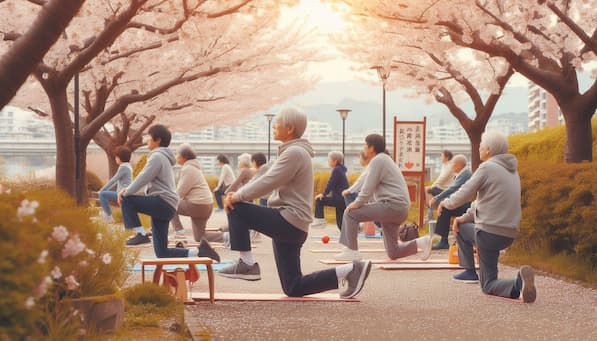
Japan has long been recognized for its remarkable longevity, with citizens often living well into their 80s and beyond. While many factors contribute to this longevity, one key element is the country’s unique relationship with Body Mass Index (BMI). In Japan, BMI is not just a number—it’s a reflection of balanced living, preventative health practices, and cultural habits that promote well-being.
Japan’s Longevity in Numbers
- Average Life Expectancy: Japan tops global rankings with an average of 85 years (87 for women and 81 for men).
- Obesity Rate: At just 4%, Japan has one of the lowest obesity rates in the world, compared to over 36% in the United States.
- Average BMI: Japanese adults maintain an average BMI of 22–23, aligning with the lower end of the “normal” range as defined by the World Health Organization.
This combination of low obesity rates and a healthy BMI plays a crucial role in Japan’s longevity.
How BMI and Longevity Are Connected in Japan
1. Healthy Weight, Reduced Disease Risk
A BMI within the “normal” range is associated with lower risks of chronic diseases such as:
- Heart disease
- Type 2 diabetes
- Certain cancers
In Japan, these conditions are less prevalent, thanks to dietary habits, active lifestyles, and regular health checkups.
2. The Role of Diet in Maintaining BMI
The traditional Japanese diet is a major factor in maintaining healthy BMIs and promoting longevity:
- High in nutrients: Meals emphasize fish, seaweed, vegetables, and soy-based products like tofu.
- Low in calories: Portion sizes are modest, and meals avoid calorie-dense ingredients like butter and sugar.
- Rich in antioxidants: Green tea, miso, and fermented foods fight inflammation and oxidative stress.
This diet not only supports healthy BMIs but also protects against age-related diseases.
3. Preventative Healthcare and BMI Monitoring
Japan’s healthcare system prioritizes prevention. Adults undergo annual health checkups, including BMI assessments, to monitor potential health risks. Programs like the Metabo Law aim to combat metabolic syndrome by encouraging weight management.
Cultural Habits Supporting Longevity
Beyond diet and healthcare, cultural attitudes in Japan also contribute to healthy BMIs and long lives:
- Hara Hachi Bu: This Okinawan principle, meaning “eat until you’re 80% full,” promotes portion control and prevents overeating.
- Active Living: Many Japanese people incorporate walking and cycling into daily routines, naturally burning calories and improving cardiovascular health.
- Social Support: Strong community ties and traditions reduce stress, which is indirectly linked to weight and longevity.
What the World Can Learn from Japan
- Balanced BMI is Key: Maintaining a BMI in the “normal” range through a nutrient-rich diet and regular activity can significantly improve life expectancy.
- Prevention Over Treatment: Regular BMI monitoring and proactive healthcare reduce long-term health complications.
- Cultural Influence Matters: Encouraging habits like portion control and active living can reshape health outcomes on a population level.
Challenges in Maintaining Longevity Trends
While Japan serves as a model for BMI and longevity, challenges remain:
- Aging Population: With one of the oldest populations globally, healthcare resources are under strain.
- Westernized Diets: Younger generations are increasingly adopting high-calorie, processed foods, leading to a slow rise in obesity rates.
Efforts to preserve traditional lifestyles while adapting to modern realities will be critical for sustaining Japan’s health success story.
Conclusion
Japan’s impressive longevity is deeply intertwined with its approach to BMI and overall health. By embracing balanced diets, proactive healthcare, and cultural practices that prioritize well-being, Japan teaches the world that living longer starts with living smarter.
Explore more about Japan’s health and BMI trends at BMI in Japan.
Key Takeaways
- Japan’s average BMI of 22–23 supports its global life expectancy ranking.
- Balanced diets, active lifestyles, and cultural habits play a vital role in maintaining health.
- The world can adopt Japan’s prevention-focused model for better health outcomes.
Related to BMI in Japan:
- Average BMI in Japan
- Japan’s Ideal BMI vs Western Standards
- BMI and Health Trends in Japan
- Japan’s BMI Standards for Kids
- Japan’s Metabo Law
- Japan’s food education concept
External Resources:
- WHO: Body Mass Index Information
- Japan Ministry of Health: National Health Surveys














